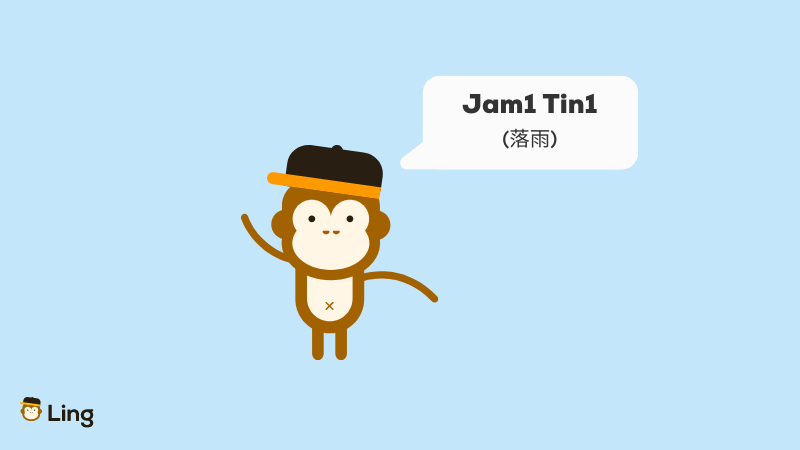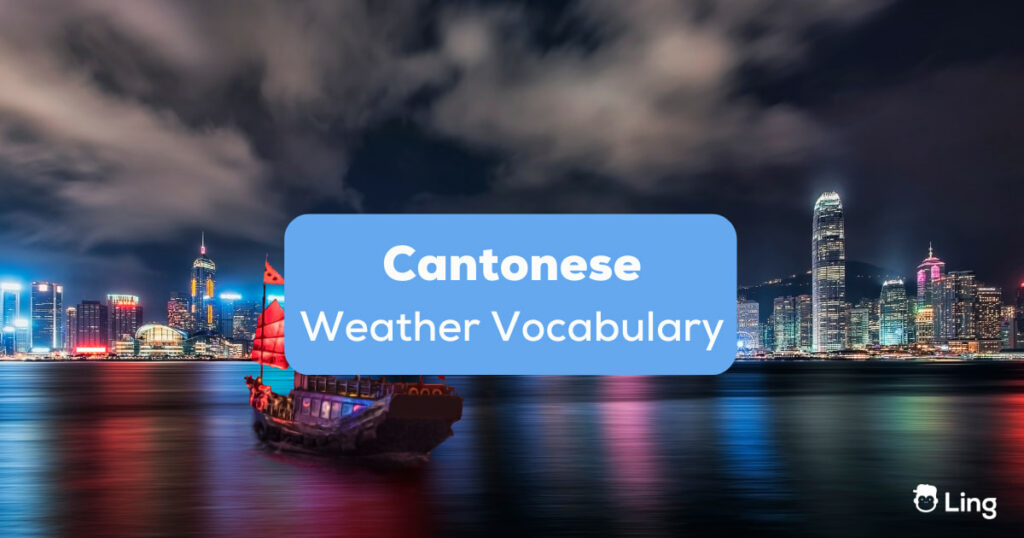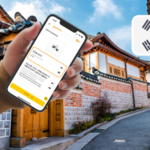Going outside? Check the weather forecast first before doing outdoor activities. If you want to impress the Cantonese speakers, one of the best ways to do so is by commenting using the Cantonese weather vocabulary 天氣 (tin1 hei3).
Ready to learn more Cantonese? Keep reading below!

How To Say “Weather” In Cantonese?
The weather is one of the important factors that affect our daily life. We plan, think, or wear clothes according to the weather. Weather is defined as the condition of the atmosphere in terms of heat or cold, wetness or dryness, calmness or storminess, and clarity or cloudiness. The Cantonese word for weather is 天氣 (tin1 hei3). In Hong Kong, this term is used in all situations like daily conversations, weather forecasts, or in school.
Hong Kong has a subtropical climate, with moderate winters and humid, rainy, and muggy summers. The four seasons in Hong Kong include humid spring, rainy summer, energizing autumn, and cold winter. The annual temperature averages 23°C (73.4°F).
When it comes to Hong Kong weather by month, November and December are the ideal months to visit because the weather is often good, with plenty of sunshine and gentle breezes. Tropical cyclones of varied intensity and periodic rains and thunderstorms may affect Hong Kong from May to November.
The Hong Kong Observatory is a government agency in charge of weather monitoring and forecasting and issuing weather-related warnings.
Basic Cantonese Weather Vocabulary
Weather is essential to consider when you’re going on a trip, especially in a different country like Hong Kong. Since we were young, we have been taught about the weather, and we’re going to that again but this time in a different language. So, let’s start widening your vocabulary and learn these Cantonese weather vocabulary so that if you hear or watch a weather forecast in Cantonese, you can understand it easily.
There’s also an easier way to memorize these vocabulary words. Check out the Ling app on the Play Store or the App Store and learn reading, writing, listening, and speaking skills right away!

Sunny – 天晴 (Tin1 Cing4)
Summer is the season in Hong Kong, where it’s usually sunny. It delivers Hong Kong unpleasant heat, rain, and frequent typhoons. The average temperature is 28 degrees Celsius to 32 degrees Celsius or even higher during the day. Locals and visitors alike can suffer from a lack of breeze, scorching sun, and oppressive humidity, so you might want to pack some t-shirts, shorts, or dresses. You might also want to bring an umbrella ( 雨傘 jyu5 saan3) to protect you from the sun and water (水 seoi2) to keep you hydrated.

Rainy – 落雨 (Lok6 Jyu5)
It’s hard to travel and do outdoor activities if it’s raining. In June, expect rainy days and the constant threat of typhoons, showers, and thunderstorms if you’re heading to Hong Kong. Bringing an umbrella and appropriate clothing for rainy days is also advisable.

Cloudy – 陰天 (Jam1 Tin1)
Generally, Hong Kong has mild, dry, and cloudy winters, with occasional cold fronts. Cloudy days are one of the best weather because you can enjoy many outdoor activities without sun exposure. Children enjoy this kind of weather because they can play outside. Hong Kong usually has this weather during the winter season.

Windy – 大風 (Daai6 Fung1)
The average hourly wind speed in Hong Kong experiences significant seasonal variation over the year. The windier part of the year lasts for 5.5 months, from September 30 to March 14, with average wind speeds of more than 11.2 miles per hour. The windiest month in Hong Kong is December, with an average hourly wind speed of 13.0 miles per hour.

Stormy Day – 暴風雨天 (Bou6 Fung1 Jyu5 Tin1)
One of the worst cases that can happen when traveling is when you experience stormy weather. If you have seen a sign or heard that the weather forecast says there will be a storm, better be ready for possible things to happen. Tropical cyclones of varied intensity and periodic rains and thunderstorms may affect Hong Kong from May to November.

Foggy – 大霧 (Daai6 Mou6)
Weather in Hong Kong can be unpredictable too. Even if it’s spring season, you can experience foggy weather. During foggy weather in Hong Kong, ferry services are temporarily suspended.

Muggy – 悶熱 (Mun6 Jit6)
Some months in Hong Kong are incredibly humid, while others are moderately humid. December is the least humid month, while April and May have the most humidity, with an average relative humidity of 83 percent.
Other Cantonese Weather Vocabulary
Here are more words and phrases in the Cantonese language related to weather:
Cantonese Sentences Related To Weather
Want To Go To Hong Kong? Plan Your Trip And Learn Cantonese First!
If you’re planning to travel to Hong Kong for the first time, you consider many factors and details to make your trip memorable and fun. Ensure that the weather is one of those things because how can you enjoy your whole trip if you’re not aware of the weather? How would you plan activities if you’re experiencing unexpected things because of the weather? How can you enjoy walking down the busy streets of Hong Kong or eating street food if the weather doesn’t agree with you?
Imagine how hard it would be if you lacked basic knowledge about the weather. So, give yourself a headstart on weather by learning these basic Cantonese weather vocabulary.
Learn Cantonese In Any Weather!
So you want to learn Cantonese, but time doesn’t agree with you? There’s no problem with that because you can learn Cantonese anytime and anywhere, regardless of the weather. Learning Cantonese can be easily achieved through the Ling app.
The Ling app can develop all your language skills to help you speak Cantonese like a native speaker. You can master your pronunciation with audio, dialogues, and speech recognition technology. You can analyze and make your sentences with the help of extensive grammar explanations. You can also have fun while learning with the help of mini-games and quizzes.
So, what are you waiting for? Say hello to the new and innovative way of learning languages. You just have to search the app or go to the website, and you can start learning Cantonese now!
Updated by CJ



































































